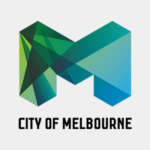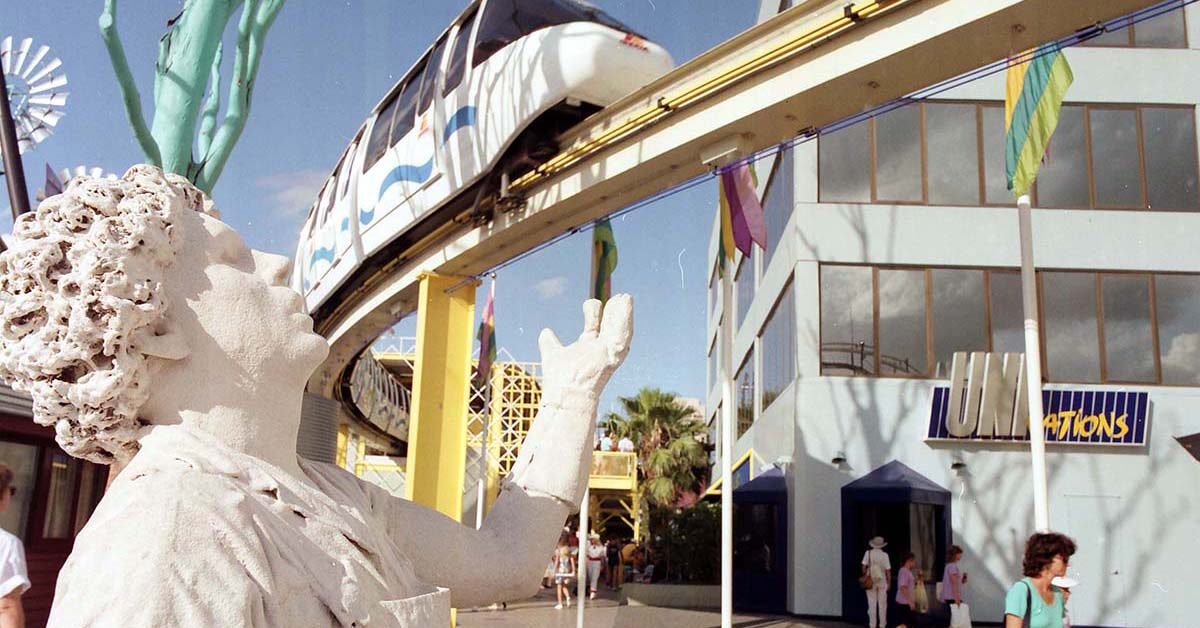Two of my grandparents went to Expo 88 and brought me back a badge that I kept for a long time after.
Expo 88 was one among many ‘world’s fairs’ staged around the world since the 1790s, designed to showcase art, technology, industry, and the nation and empire, and to be spaces of leisure, bringing in economic benefit. Perhaps the most famous one was held in 1851 at the specially built Crystal Palace in Hyde Park in London, with the theme ‘Great Exhibition of the Works of Industry of All Nations’. They’re a bit of an odd thing, really. Highly colonial. Expo 88’s theme was ‘Leisure in the Age of Technology’ and it had ‘Expo Oz’, a platypus, as its mascot. Expo Oz had a blue bill and yellow shirt and hat, and he stood on his hind legs. I highly recommend looking up pictures of him.
Along with lots of other older Jews, my two grandparents would go each winter to Surfers Paradise for a long holiday, so they would have gone to the Expo then I assume. A little exodus of Holocaust survivors and friends from Kulin country to Yugambeh land and water to warm their bodies and bones.
Explore the archives
‘Bodies. Lives. Intertwined.’ is a response to Lily Brett’s ‘Miriam‘, originally published in Overland #110 (1988). Read the full issue.
I imagine them sitting and talking and drinking coffee and walking slowly along the boardwalk. Sharing stories and wearing bathers and open shirts. Their bodies sitting differently for them. A certain sexual aura in the air.
I circle around and around my grandparents’ stories, even though I know very few. On the shelf in my apartment, I have a lovely photo of the two of them: they look at me when I eat my breakfast and when I sit tap-tap-tapping on my computer. This photo keeps me company, and I wonder about them as I go about my day, listening to music, reading news and stories and people and books, catching the tram to work down Lygon Street and past the streets where they used to live and walk. In the photo they’re beautifully dressed and nice and fleshy (they’re so different from the photos of them soon after the war). They have kind smiles. My grandmother is wearing a jumper and jewellery that I would absolutely love to be able to wear today. They look content. I wonder what role romance and sex and intimate relationships played in their lives. I wonder what love meant to them.
A couple of years ago my uncle wrote on Facebook, in response to a cousin sharing the ad for a panel on remembering the Nakba that I was participating in, that my grandparents would have been disappointed in me. I don’t know if he’s right, but I hope not. My body is so completely similar to my grandmother’s—our shoulders, our hair, our nose—that I hope she would have seen what I was trying to do, even if she disagreed. But I hope that she wouldn’t have disagreed.
Jewish bodies are not simple things. Early Zionists actively wanted to reform the Jewish body, to make it hard and fast and strong and lean: not rounded, soft, gentle, tender. To make it firmly heterosexual, masculine, aggressive. In this vision, Jewish bodies were meant to take up space through strength and assertion, but to neatly contained in how they were built. These ideas continue. They remain in how Zionism is lived in the everyday: with a conscription army inside the State of Israel and the mass use of security guards and the paraphernalia of security culture among Jewish Zionist communities in Australia, we see it every day. We see it too in Zionist youth movements and in the social demands on Jews to marry other Jews and have Jewish babies.
When I was in Palestine in 2007, doing research on cultures of Holocaust memory (a trip I wouldn’t do now, because of BDS), I stayed with a high school friend who had moved to Israel. It was scorching hot, and I was sweaty and hairy and unkempt, while she was lean, with short straight hair, everything in its place, no sign of sweat ever. It was stark and fascinating.
Lily Brett’s depiction of bodies, sex, food, neuroses, relationships and Holocaust memory was published in 1988, the year of Australia’s Bicentenary, and so it, in some ways, sits as part of that moment in time. Or, maybe to put it better, I want to think about it in terms of that moment. Invited into the vast archives of Overland’s past, I went straight to the 1988 editions to think in some ways about nation-building, about how Overland might have been thinking about this moment, in its time. I love that this piece might be part of that time, not because the nation should be built (it shouldn’t: Australia must end), but because this is something other and I want stories like this—that tell of a location in place, but which do not try to build the nation—in my collective past.
There is an invitation there to reflect on past relationships I’ve been in, with the non-Jews and the Jews. The textures of the bodies and the love that has flown between us. The passions and the hurt. The ambiguities and the incredible neuroses. Garth’s new trousers had three pleats on either side of the zip. Until now, he had worn skin-tight, pegged-legged Levis. Miriam looked at Garth. She found the loose space between his legs alluring. She started to think about what lay behind those parallel pleats.
I went for a walk along Merri Creek during the long lockdown in 2021, shortly after my boyfriend and I had broken up, with a friend who has three kids, two cats and a husband, and she told me how she constantly had someone touching her. I spoke of how I never got to touch, or be touched by, another person. I now tell this story sometimes as a funny moment to illustrate the vastly different experiences of lockdown. I don’t know that it really is funny, but I know skin hunger(s).
Garth stood next to Miriam. He wound his leg around her leg, and stroked her face. All three children were at school. They lay down and had a noisy fuck. After she came, Miriam wept and wept. She often cried after a strong orgasm. She knew that it usually meant that she had been shutting herself off from any intense emotions, been out of touch with her sadness.
Shortly after my breakup I got a pair of shoes fixed by the cobbler on Nicholson Street. I waited while she polished my shoes, and there was something in the care with which she buffed the rounded heels that made me burst into tears. I was being looked after by hands that take care and want the best. She was kind. We joked together about the awkward emotions of breakups. The whole body can be taken over by these moments: they are not solely of the mind and the heart, but my stomach—with its very Jewish IBS curses—felt these emotions deeply. There were so many levels and layers to the strangeness of those times.
My Jewishness and my Jewish body has been an issue in some relationships, but not all. My body can do some things but not others. At times I’ve cursed my body for what I think it can’t do. I don’t always give it credit for what it can do.
When I started living by myself, six years ago now, I started baking a lot more, and with lockdowns that increased. Cakes could be easily transported and shared. Every Shabbos dinner I take cake to my parents’ place and my mum talks about how I’m good at baking like my grandmother was. I make mostly butter cakes, apple cakes, cheese cakes, lemon cakes. Simple and warming, rounded.
In the last part of 2021, that same friend took me to an outdoor exercise group. I had had to break up with my therapist, who had helped me in some ways but who had become inappropriate, and exercise would keep my brain moving. I’ve kept going, both in the gym and with the group, and I now have muscles and can do sit ups. My body remains pleasingly soft, but has grown a firmness. But I am resolute that this is not a Zionist strength. It’s to make me more at home in my body and with what it can do in the world and in relationships. When it winds with other bodies, it feels different now. I still have some way to go, but I am more in my body. My body is sturdy. I hope it can fight.
I sat recently in a meeting with someone objectionable and pondered how in different circumstances I would fight them. Physically. I thought about punching them in the neck. But civility prevents such things happening. We have agreed on rules for what bodies can do in particular places. We agree to some of these rules without even knowing it. Such is the bodily discourse.
Bodies are a relationship, they contain stories and ideas and histories, some of which we make and some of which we are made by, in a circular never-ending movement. Sometimes it makes me weep a little, thinking about this little body of mine in space, all the conversations and moments it has been part of. That tram to work that takes me past my grandparents’ places also takes me past what I’ve come to term ‘exes row’, a short span of streets where three of my exes live(d). Stories are overlayered. Nothing is only one thing. The roundness of life comes for us all, maybe.
 This piece was funded through the generous support of the City of Melbourne.
This piece was funded through the generous support of the City of Melbourne.



